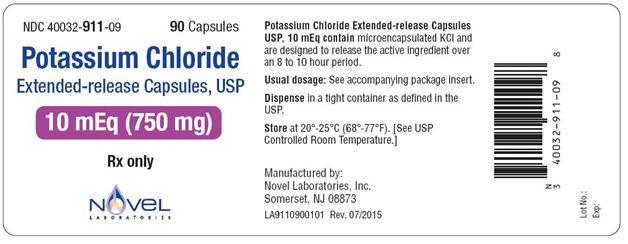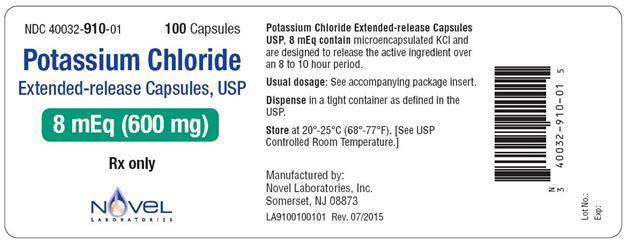Breast milk is superior in nutrition, It provides resistance against infections and allergies, It is naturally sterile. Despite all the advantages of breastfeeding some mothers choose to pause the breastfeeding in fear of harmful effects of medicines passing in breast milk. Are you wondering about breastfeeding and using Potassium Chloride Capsule, Extended Release ? Know what is Potassium Chloride Capsule, Extended Release and how it can affect your breast milk and whether Potassium Chloride Capsule, Extended Release is safe for your kid or not.
What is Potassium Chloride Capsule, Extended Release used for?
BECAUSE OF REPORTS OF INTESTINAL AND GASTRIC ULCERATION AND BLEEDING WITH CONTROLLED-RELEASE POTASSIUM CHLORIDE PREPARATIONS, THESE DRUGS SHOULD BE RESERVED FOR THOSE PATIENTS WHO CANNOT TOLERATE OR REFUSE TO TAKE LIQUID OR EFFERVESCENT POTASSIUM PREPARATIONS OR FOR PATIENTS IN WHOM THERE IS A PROBLEM OF COMPLIANCE WITH THESE PREPARATIONS. For the treatment of patients with hypokalemia with or without metabolic alkalosis, in digitalis intoxications, and in patients with hypokalemic familial periodic paralysis. If hypokalemia is the result of diuretic therapy, consideration should be given to the use of a lower dose of diuretic, which may be sufficient without leading to hypokalemia. For the prevention of hypokalemia in patients who would be at particular risk if hypokalemia were to develop e.g., digitalized patients or patients with significant cardiac arrhythmias, hepatic cirrhosis with ascites, states of aldosterone excess with normal renal function, potassium-losing nephropathy, and certain diarrheal states. The use of potassium salts in patients receiving diuretics for uncomplicated essential hypertension is often unnecessary when such patients have a normal dietary pattern and when low doses of the diuretic are used. Serum potassium should be checked periodically, however, and if hypokalemia occurs, dietary supplementation with potassium-containing foods may be adequate to control milder cases. In more severe cases, and if dose adjustment of the diuretic is ineffective or unwarranted, supplementation with potassium salts may be indicated.
I am currently breastfeeding and I want to know if using Potassium Chloride Capsule, Extended Release is safe for my kid? Does it have any effect on milk production?
Active ingredient in Potassium Chloride Capsule, Extended Release is Potassium chloride and based on our analysis of Potassium chloride it appears that using Potassium Chloride Capsule, Extended Release is safe in breastfeeding. Below is analysis of Potassium chloride while breastfeeding.
Potassium Chloride Capsule, Extended Release Breastfeeding Analsys
SafeCAS Number: 7447-40-7
Human milk has a potassium concentration of 13 meq/L, almost a half of rehydration solution content and a quarter of maximal IV recommended dose. Potassium supplementation does not alter milk concentration without increasing mother’s serum concentration, which is strictly limited from 3,5 to 5,5 meq/L.

What if I already have used Potassium Chloride Capsule, Extended Release?
As usage of Potassium Chloride Capsule, Extended Release is mostly safe while breastfeeding hence there should not be any concern. In case of any change in behavior or health of your baby you should inform your health care provider about usage of Potassium Chloride Capsule, Extended Release else no further action is required.
My health care provider has asked me to use Potassium Chloride Capsule, Extended Release, what to do?
Definitely, Potassium Chloride Capsule, Extended Release is safe in lactation for baby. No wonder your doctor has recommended it.
If I am using Potassium Chloride Capsule, Extended Release, will my baby need extra monitoring?
No extra baby monitoring required while mother is using Potassium Chloride Capsule, Extended Release
Who can I talk to if I have questions about usage of Potassium Chloride Capsule, Extended Release in breastfeeding?
US
National Womens Health and Breastfeeding Helpline: 800-994-9662 (TDD 888-220-5446) 9 a.m. and 6 p.m. ET, Monday through Friday
UK
National Breastfeeding Helpline: 0300-100-0212 9.30am to 9.30pm, daily
Association of Breastfeeding Mothers: 0300-330-5453
La Leche League: 0345-120-2918
The Breastfeeding Network supporter line in Bengali and Sylheti: 0300-456-2421
National Childbirth Trust (NCT): 0300-330-0700
Australia
National Breastfeeding Helpline: 1800-686-268 24 hours a day, 7 days a week
Canada
Telehealth Ontario for breastfeeding: 1-866-797-0000 24 hours a day, 7 days a week
Drug Brands with same Active ingredients



